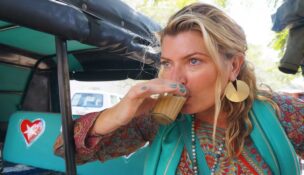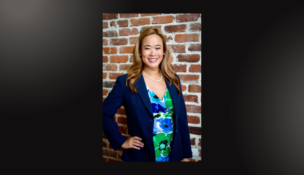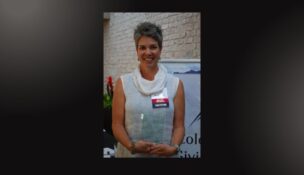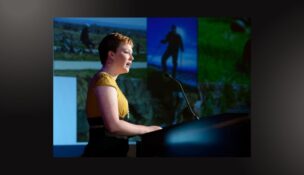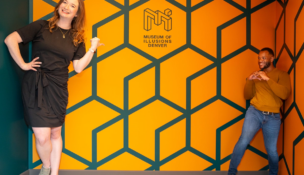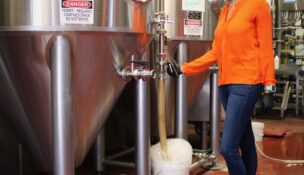Good Company: Nicole Sullivan and Her Indie Book Empire
After closing BookBar at the beginning of 2023, entrepreneur Nicole Sullivan writes her next chapter as a publisher, philanthropist and First Amendment activist.
Jamie Siebrase //December 12, 2023//
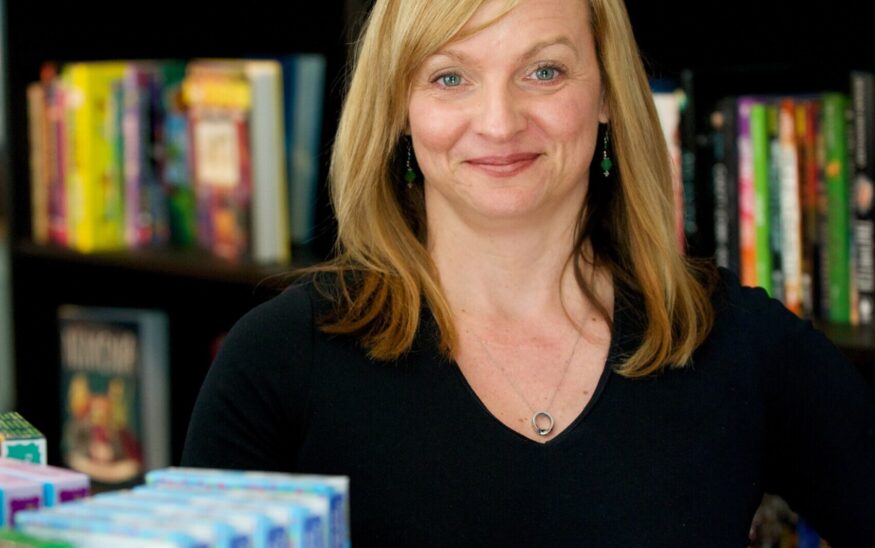

Good Company: Nicole Sullivan and Her Indie Book Empire
After closing BookBar at the beginning of 2023, entrepreneur Nicole Sullivan writes her next chapter as a publisher, philanthropist and First Amendment activist.
Jamie Siebrase //December 12, 2023//
Explore the journey of Nicole Sullivan, founder of BookBar Press and owner of The Bookies, as she discusses navigating the complexities of book banning, the intersection of free speech and diversity in the publishing industry, and the evolution of her literary empire.
Nicole Sullivan
Founder of BookBar Press; owner of The Bookies; founder and president of BookGive
Age: 50
Hometown: Cape Girardeau, Missouri
What she’s reading: “The Identity Trap: A Story of Ideas and Power in Our Time,” by Yascha Mounk. Sullivan says she’s been stuck on nonfiction since 2020.
ColoradoBiz: No use holding back. We’re talking about the book industry, so let’s jump into the juicy topic of book banning. Not only do you own The Bookies in Denver, but in 2020 you launched a publishing house (BookBar Press). Have you felt pressure to keep certain books off your shelves and/or away from the printer?
Nicole Sullivan: Well, not as many books are being banned as the media will have you believe, but I think it’s good to call attention to the issue. There’s a difference between banning a book and challenging it. Most libraries have a multi-step process for bans. Because of that, most bans occur in schools, not libraries, but even challenges are destructive because it takes time for librarians to respond to challenges. Bookstores and publishers are completely different. We don’t have to adhere to the First Amendment in the same way libraries and schools do.
CB: And has that shielded your businesses from calls for suppression?
NS: Not exactly. What’s happening in bookstores is that booksellers are getting more and more progressive, and are refusing to sell some books to customers. Suppression happens at publishing houses, too. Employees at publishing houses have had walkouts because they don’t believe in a book. Sometimes there’s pressure from the outside to cancel publication or rescind a book. You might see restriction on access during the creative process, too, when authors are driven into self- suppression. And then once a book gets to the bookstore, we’re back where we started, with the booksellers as the gatekeepers at the store. It doesn’t matter what political side you’re on. All restricted access is insidious.
CB: Has taking a stand impacted business?
NS: I don’t know. Most of our customers aren’t very aware of what happens behind the scenes in the bookselling industry. But for anyone who is paying attention, I’m guessing we’ve lost some customers. No doubt we’ve gained customers, however, who understand that this fundamental right of free speech ensures we all have greater access to an array of ideas and experiences through books.
CB: When you bought The Bookies in 2021, you were already entrenched in the local book scene. For almost 10 years you owned and operated BookBar, a beloved bookstore/wine bar on Tennyson Street that closed at the beginning of 2023. Fill us in on this first segment of your career.
NS: I opened BookBar in 2013, in a space where one of our community bookstores had closed. I saw it as a place for everything from book clubs to children’s story times. That was the vision: a community literary space with food and beverage.
CB: The food industry can be a tough grind. Do you have a background in F&B?
NS: I worked in a few restaurants in my 20s. I dabbled, did a bit of everything, and then I had babies and stayed home with my kids for seven years. It wasn’t until they went to school full-time that I started thinking, “OK, now what?” I didn’t set out to open a bookstore, but I’d gone to culinary school, and I’ve always been a big reader, and I got sucked into my idea for a bookstore wine bar.
CB: If you never intended to open one bookstore, then how’d you end up with two?
NS: I bought The Bookies in 2021, after the owner (Sue Lubeck, the store’s founder) passed away. The pandemic was winding down; things were pretty stable. The initial thought was that we’d merge all the back-office stuff. On paper it made sense. But the more time I spent at The Bookies, the more I loved the culture Sue built there. The Bookies and BookBar were two different environments run on two different business models.
CB: Care to elaborate?
NS: The Bookies is staffed largely by former school librarians and educators, and all the staff have such a passion for literacy and book access. They are doing this work for the same reasons I do it. At the same time, combining a bookstore and wine bar was harder than I’d expected. It was two businesses in one, really. I was about to turn 50, and I was ready to carve out more time for me and my family and reading and travel. It seemed like a natural life progression to let BookBar go. We own the building, and our tenants are opening something else there. I can’t say what it is just yet, but it will be a fresh concept.
CB: Was it hard walking into someone else’s business?
NS: Just the opposite, actually. I’ve really enjoyed the process of coming into somebody else’s business and making sense of it, learning, finding ways to be more efficient. There’s more to it than that, though. My identity was really tied up in BookBar, and that was a lot of pressure. It feels good to be working with somebody else’s company. Sue built this incredible culture at the store, and that eased the transition. When I started getting to know the staff, hearing the stories about all the years they’d worked together, I realized we’re truly a family.
CB: It sounds like you’re saying that building a positive work culture might be one of the more important aspects of running a business.
NS: Exactly! And that was really all Sue. Coming here, it made it easy to let BookBar go, and I had to let it go.
CB: The Bookies is in the process of relocating as we speak. Can you tell us more about the move?
NS: I knew when we purchased The Bookies that we’d be moving. The current store is tucked into a corner of a strip mall, and it has to be a destination. I purchased the Lehrer Fireplace & Patio store on South Holly Street in May of 2023. (The Lehrers still have two locations; they aren’t going out of business, just downsizing.) I’m a big believer in owning your property if you can make it work in any way, shape or form. It’s a smart financial move because then if the business doesn’t work, you’ve still built equity.
CB: What drew you to the Lehrer building?
NS: It’s huge, almost 13,000 square feet, and there’s a taekwondo studio on the second floor. We’ll have plenty of space for the retail bookstore on the first floor. We’re not going to downsize, but I want to build in more community spaces with seating, a lounge area and a community event room. The Lehrers left us some fireplaces, so we’ll have two fireplace areas. We’ll have a 2,000-square-foot warehouse in the back of the building that will house the nonprofit BookGive. And our publishing company will also operate out of the warehouse.
CB: Is it fair to say you’re building a book empire?
NS: I call it a literary compound. We’ll have people coming in to write their books and publish, and then they’ll sell them at the store. After the books have been read, people can come back and donate them to the nonprofit. It’s this whole ecosystem, actually, and that concept of ecosystems is informing our retail design scheme.
CB: Getting back to your business, what prompted you to open a publishing company during the pandemic?
NS: I had a few reasons. I’m interested in learning about the whole industry. I’d learned about the bookselling side, and I wanted to learn more about publishing. We have consignment for self-published authors at The Bookies — it was something I started at BookBar — and some authors come in with books that are clearly unedited. I’m not making any judgment, but I saw an opportunity to help local authors through the publishing process while also publishing content we think is important to get out into the world.
CB: What does it take to make publishing profitable in the current climate?
NS: Who knows? I don’t know! We’ve been talking with so many other publishers who have been doing this for a long time, and there’s no easy answer. I don’t know what the path is to profitability. What I do know is that nothing I do is ever for profit, and even publishing is more of a community endeavor. The margins are so thin. The main point is that we’re getting stories out and connecting local authors with readers.
CB: Has the consolidation of big publishing companies impacted small publishers?
NS: No, it impacts us more as a bookseller. As the publishing companies continue to consolidate, I think there’s just that much more room for smaller companies to capture the voices that are getting lost. We’ll primarily be focusing on regional middle grade novels. We’ve published three so far, and they’ve done well.
CB: Why middle grade?
NS: The big focus at The Bookies has always been education. The store primarily stocks children’s books. We have a growing adult section, but the overall focus of our inventory will be education and environmentalism.
CB: We’re curious, how is AI impacting the publishing industry?
NS: I don’t know, honestly. My husband is a tech guy, and he could talk to you for an hour. I kind of have my head in the sand about the whole thing. I don’t know enough about it to be either afraid or excited. My feet are still firmly planted in the traditional printed page world.
CB: You mentioned earlier a third prong of your literary ecosystem. Can you tell us a little more about BookGive?
NS: Before I owned my first bookstore, when I was home raising kids, I got together with a group of friends. We created Northwest Denver Community Book Exchange. It was an annual event, and people would bring more books than they’d leave with. We’d end up with a thousand leftover books, so we started building partnerships with organizations that needed books. When I opened BookBar, I brought the program into the store. Then in 2018, we purchased a building and moved the nonprofit into its current headquarters at 4890 Lowell Boulevard. We have about 300 volunteers on the roster who sort books by genre, then match organizations with the specific books they need. We call it curated giving. Since getting our 501(c)(3) status in 2020, we’ve donated over 200,000 books throughout metro Denver. We’re currently expanding our footprint to serve rural communities where books are being banned.
CB: And we’ve officially come full circle. Best of luck getting The Bookies moved to its new location at 2085 South Holly Street.
Jamie Siebrase is a freelance writer based in Colorado.






